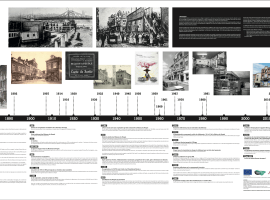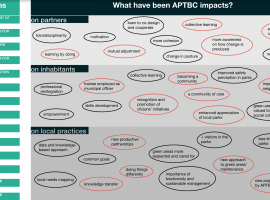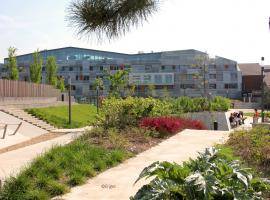The first lockdown in Belgium was established from the 13 of March 2020. At that time, we had agreed upon the challenges with all internal partners, we were establishing contacts with external partners. The kick-off meeting of the project was expected to take place at that time, so we were occupied with its organisation: behind this event, we needed to find the most appropriate approach to publicise the project and its goals, to identify within municipality and grassroots associations those who could become our points of contact, with whom to build a relationship of trust. In addition, we wanted to build multi-level governance by engaging also the regional government. The kick-off event should have hosted the regional minister of Social Action and Employment, who happens to be also in charge of public health. With her withdrawal for evident reasons, it became very clear that priorities were about to change, at any level of power. The effort was being directed toward emergency instead of planning.
How the pandemic diluted the project and how we learnt to stay put, but actively
What happens when suddenly most activities must stop, people have to face an unprecedented situation - both within and outside the project - and plans are disrupted? In particular, if the main goal of your project is to improve social and spatial inclusion through citizens' and local stakeholders' mobilisation, how do you cope?
Through a conversation with Julien Bebronne and Lauranne Liégeois we try to explore the impacts of the pandemic on the management of this UIA project, how project management reacted to this challenge and what lessons they think they have learnt.
We had to cancel the launch event scheduled on the 2 of April 2020 and we rescheduled it for the 20 October. Unfortunately, at the end of summer, the situation deteriorated and we were forced again to cancel the event, which has not been rescheduled since then.
Nevertheless, some actions could be planned and start before the beginning of the lockdown, in January and February 2020, so that excessive delays could be prevented. For example, CPAS and Natagora could select first and then train the beneficiaries of our nature-based training programme. The all process was organised by step, in order to make the best of every little reopening or relaxation of rules. We could also take advantage of two aspects: first, that the training was expected to develop outside, in the parks, and second, that CPAS’ services never stopped being supplied for their being essential for the population. This latter was also the opportunity for our partner Psykolab, which being based in France could not pursue their work on the parks, to invent a form of remote inquiry. By borrowing a gopro camera, our colleague from CPAS could perform direct observation in the green areas of the city centre on the behalf of Psykolab and collect information that otherwise could not be used for analysis. Also, our survey, which aimed to get information about citizens’ perceptions of parks, green areas and the city centre, could be carried out in the field and provided enough data before going completely online.
As an overall strategy, we have tried to play with rules, which means that each time a restriction was lessened or removed, we took the opportunity to go on with our planning. For example, with regard to the participative process, our partner Lema was able during last summer to carry out the exploratory walks as planned, because it was an open-air activity. On the other hand, we saw our final objective, which is to build a community in the area, get away a little bit.
We found it difficult to go from theory to practice, because of this suspended time. We had fewer things to put in practice, because many activities were on hold and this occurrence led us to stay with the intellectual level for some time. What we missed a lot was the informal moments between partners. The consequence was that each of us did not allow him or herself to ask questions to others, since every moment was organised and structured. We have tried to work on enhancing the cohesion through moments of sharing but to keep on co-designing remotely has been really challenging. In fact, you can work on the best scenario but as long as you cannot implement it, you risk slipping into some form of weariness. In the end, you lack practical feedback about what you are exploring just theoretically.
This hurdle has also complicated our synchronisation with municipality’s expectations and priorities, which are generally more concerned with the operational level. Ultimately, the pandemic has extended reasoning and reflexion thus deferring operational interactions with decision makers within the city.
The pandemic was an opportunity for improving the sharing of information among partner, at least at the formal level. This was also facilitated by the arrival of a new communication officer who, in order to better organise and disseminate information about the project, needed to fully understand each aspect of the project itself and the exact contribution of each partner. The expanded time of the health crisis allowed us to establish richer and more intense connections between our project’s actions, at least at the organisational level.
On the whole, we had to reinvent us. We had no choice but to find new ways to communicate, to work, to coordinate with each other. And we had to learn quickly how to adapt to new tools, especially the digital ones, looking for a sort of conviviality after all and also knowing that many of these tools would be integrated completely in our future work. Nonetheless, some actions cannot be implemented remotely. It is simply not possible.
Many people had to take the lead and just experiment, for they knew that it was the only way forward. This has concerned, for example, remote working, which is something that for many was anything but obvious. Innovation has to be found probably in the change of mindset. And the added value of a European project in these difficult times is allowing experimentation and exploration, enabling to sow seeds through a vision, an idea to pursue.
What has really impacted on the project is that we lost conviviality and the opportunities for participation. We knew since the start that civic participation in Seraing would have been hard to encourage because it is not a mainstream practice, but the privileged entry points that we could have to mobilise the residents…they have gone: a festival in the neighbourhood, the Easter party…to open up a new public space was impossible over the past months.
We could not be on the field; so we lack a clear understanding of what has been going on during lockdowns. In this atmosphere of waiting, we have even limited ourselves as long as we could not be sure of what we would be allowed to do: for example, the parks were first closed, then it was possible to gather outside in groups of four; then, at some point, people were allowed to meet in groups of up to ten individuals. And many people in Seraing felt the same atmosphere of uncertainty and acted accordingly, avoiding public spaces.
The problem is when your objective is first and foremost to be able to build trust with stakeholders and citizens and you know that you cannot do it remotely. You build trust on the field, by meeting people; and it takes time. At the very least, the trainees who have been employed in the park management activities could carry on their work on the field and establish a direct contact with citizens through a continuing presence, thus producing a positive tangible impact and making the project somehow “visible”.
If engaging residents was a big challenge since the beginning, with the pandemic what we fear most is that people have become more fearful, more reluctant. People who already had many reasons for not participating in the making of the common have now some extra reasons. With the Covid-19 crisis we have been witnessing to a reinforcement of social bubbles: if individually we break social distance, we choose to do it with those we trust. In terms of society this might be very dividing and bring more mistrust.
Our objective is now to be able to make our new public spaces as open as possible while respecting individuals and identifying new needs in terms of social practice.

























